
views
X
Trustworthy Source
National Institute of Diabetes and Digestive and Kidney Diseases
Health information from the National Institute of Diabetes and Digestive and Kidney Diseases, a division of the U.S. National Institutes of Health
Go to source
Unhealthy weight can also negatively impact the intimacy you share with you wife, leading to marital strain and frustration. If your wife's weight concerns you, whatever the reason for your concern, you can take positive steps through proper communication, dieting, and exercise.
Communicating Your Concerns Effectively

Express your concerns about her health, if appropriate. As her husband, you will likely have some idea of what way will be best to convey this information to your wife. You may be able to simply sit down and talk, you might have to find a way to express this more gently. In any case, you may have better results if you: Share how you feel. Women use conversation to discover their feelings and tell these feelings to others. By doing the same, she might be more receptive to what you are saying. You might say to your wife, "I love you so much, seeing you struggle with your weight has me worried. Is it OK if we talk about it?"

Use passive measures, if appropriate. Some wives don't need, or want, to be hit over the head with a message about their weight. If this is your wife, you might want to try indicating your concerns passively. You might do this by: Changing your grocery habits to healthier options. Exchanging food-centered activities for more physically engaged alternatives. Telling your wife that you want to get fit for yourself, and you'd like her help.
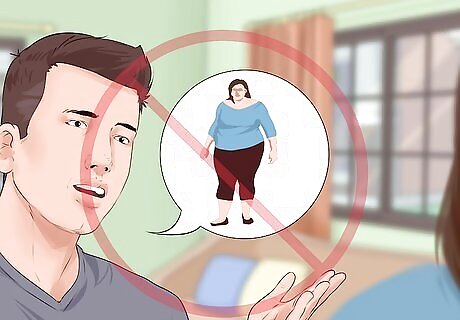
Avoid judgmental language. Even if you have your wife's best interests in mind, using judgmental language could potentially lead your wife to internalize those comments, feeling like she's not good enough on the inside. Some phrases you should avoid include: "You've put on weight." "Did you stick to your diet today?" "You shouldn't eat that." "Aren't you full?"

Notice emotional problems that might be affecting her weight. It might not be diet or exercise that is causing your wife to be overweight, she could be suffering from depression or stress.Depression is a common problem women cope with, and many don't receive the help they need. This can result in negative patterns, like overeating and oversleeping/lethargy. Consider the following symptoms when evaluating your wife: Depression is often indicated by: Regular feelings of sadness, anxiety, emptiness Lack of interest and participation in pleasure activities, including sex Excess sleeping or disturbed, unrestful sleep Lower than normal energy levels Stress, while usually more obvious, can also be marked by: Headaches Back pain Poor sleep Stomach issues Excess tension

Address emotional issues, if applicable. The sources of depression or stress are sometimes obvious, like the loss of a loved one, a new job, or the arrival of a newborn into your life. Some causes, however, can be subtle, so you should talk with your wife about how she feels and whether or not she might be feeling the effects of either of these. If she is, you might: Recommend exercise, as the release of endorphins experienced during and after working out can boost her mood and fight symptoms of depression and stress. Suggest that you both try meditating, as studies have shown that this can alleviate both stress and depression. Discuss the possibility of going together, or if comfortable, of her going alone to see a therapist.
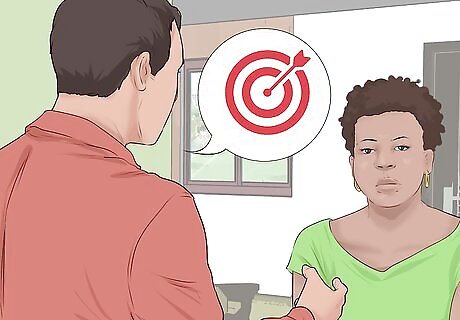
Talk about goals that will be easier to attain if fit. You may have dreamed of walking the Great Wall of China when you were a younger couple, or perhaps you've always wanted to go on safari, or hike the Appalachian trail! Remind your wife of these goals and dreams, and use that conversation to gently bring up your concerns about her weight.
Establishing a Good Diet

Diet together. This is especially important if you have a more active metabolism or professional life than your wife. Seeing you chow down on your favorite foods while she has to adhere to a more rigid diet can lead to resentment or poor self-image. If she has bought or prepares special diet food, try to encourage her healthy behaviors by participating in her dietary plans. Have a bite to show your support!
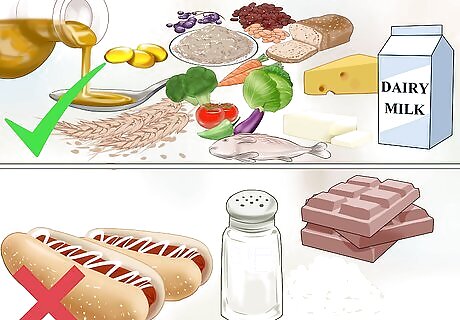
Balance your diets. It's only natural that people tend to load their plates with the food they like, but in many cases, this creates a nutritional imbalance that is unhealthy. Variety is important; different foods contain different vitamins and other nutrients. Try to: Include all food groups: protein, grains, vegetables, fruits, and dairy. Eat some healthy fats, like omega 3 fatty acids. Avoid too much salt, fat, or sugar. Skip empty calories, or calories with little nutritional content, like:SweetsSweetened beverages (like energy and sports drinks)PizzaIce cream

Eat a rainbow of color, especially for vegetables and fruits. The colors in your food are generally an indication of phytochemicals and other nutrients important for your health. An easy way to improve you and your wife's diet is by eating food from a wide range of colors.
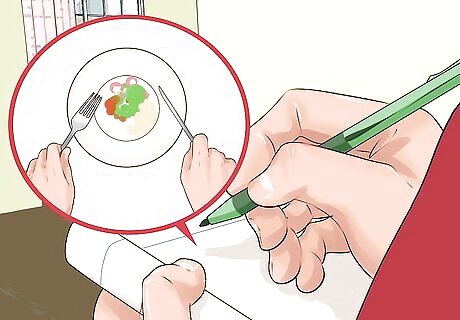
Track your consumption to master eating habits. You and/or your wife may feel like you are being oppressed as you tally up the number of calories you consume throughout the day, but calorie and portion control are vital to losing weight. In the words of Peter Drucker, consultant and author, "What gets measured, gets managed." Though fad diets focus on certain kinds of food and/or sources of nutrition, many researchers today stress how overconsumption of calories is the true culprit of weight gain. Keep an eating log on your phone or in a memo pad you can carry throughout the day. List everything you eat, look up the caloric cost of those items, and identify which foods are your caloric trouble spots.
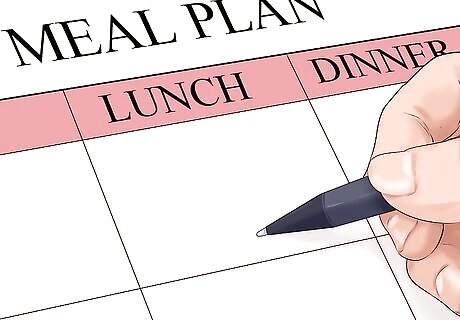
Write up a meal plan. Meal plans will do more than help your wife lose weight. A meal plan can also save you time, money, and stress, all while preventing you from indulging in more convenient, less healthy options. If you notice, through your eating log, that you are not getting enough of a certain food group, tailor your meal plan to improve this.

Consult a trained dietitian with your wife. A dietitian has the knowledge and skills to help you come up with a balanced, healthy plan for your wife's weight loss diet. You may want to bring your eating log and any meal plans you've devised on your own. This way your dietitian can: Offer guidance and advice about what you've already done, what can be done better, and how you might improve down the road. Have a full idea of your lifestyle and preferences. On the spot, you might not know what to say if he were to ask you about your diet. Having your eating log on hand can help him advise you more efficiently.
Making Exercise Routine

Exercise together. The time you spend exercising with you wife is not only good for your health, it can also promote bonding and happiness in your relationship. Show solidarity and support for your wife by encouraging her throughout the exercise, and by taking part in her healthy choices.
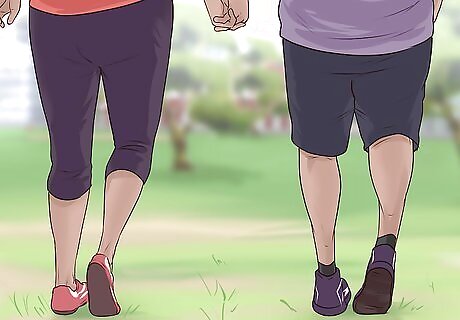
Start with small, enjoyable activities. Depending on the weight of your wife, it may not be feasible to hit the gym right away. She might even hate going to the gym. Instead, start with small, routine activities, like: Going for a walk in the morning A leisure sport, like tennis Bird watching Shell or sea glass collecting Dancing

Spend weekends doing physical activities. Even something as simple as going to the park can help relax and restore her mind and body. You might want to take a Frisbee along, or your dog. You should also consider: A visit to a scenic lighthouse. A trip to a museum or exhibit. Visiting local historic sites.

Plan regular activities. Routine can give a sense of safety and pleasure to your weekly activities. Generally, it takes an average of 66 days to establish a new habit, and by planning on regular activities can help establish that habit. You and your wife might agree on doing three exercise oriented activities every weekend. Encourage her to increase intensity and frequency as her fitness improves.
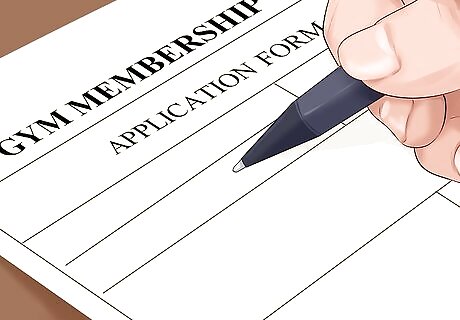
Get a gym membership and consider a trainer, if applicable. Although not necessary to improve her fitness, a gym membership would provide many resources to her. Besides exercise equipment, many gyms also have trainers on staff. These individuals can help you develop a personalized exercise plan for her weight loss. A personal trainer can also: Help her develop accountability Motivate her Realize new perspectives Achieve proper technique and form
Encouraging Her Success

Eat out less frequently. A special night out every once and a while isn't so terrible, but the rich and delicious food prepared in most restaurants has been linked to higher calorie consumption and poor nutrition. Save yourself some money and: Go on a picnic with healthier, homemade food. Make healthy alternatives of your favorite restaurant recipes at home.
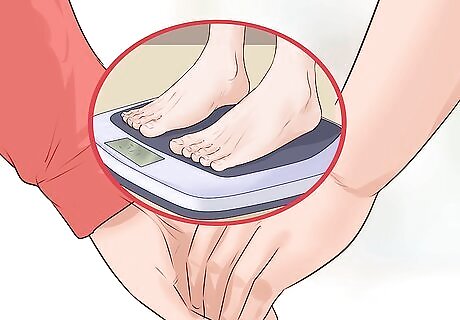
Set realistic goals together. It will be easy for her to fall into the trap of fixating on a magic number that, when achieved, will mean she is healthy. But poundage doesn't necessarily translate to healthiness. If your wife is exercising and dieting, she may shed inches and tone up but stay the same weight. Muscle is denser than fat, so it's possible to get significantly healthier while maintaining roughly the same weight.
Use healthy incentives to encourage her. Instead of a decadent night out full of food and drink, the use of healthy motivators can be a game changer. Plan to celebrate certain milestones and accomplishments, like her first month of exercise, with things like: A couples painting class Tickets to her favorite music A manicure A massage

Praise her for her effort and successes. Even if you do not see immediate results, tell her how proud you are of her hard work as encouragement. Ask her if there are any additional ways that you can show her your support, and try to implement her suggestions.

Cheer her on consistently. Even if she falls short of the goal, be sure you are regularly reminding her that you're proud of her effort. In some cases, you might offer too much praise, making her feel like you're talking down to her. Don't take offense. Express that you only want to applaud her efforts and ask her how you can do that better. Try to understand that: She's working hard to lose weight at your initiation. Losing weight can be physically and emotionally exhausting.


















Comments
0 comment